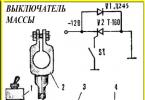Gasoline power plants, depending on the type of installed engine, require oil with certain properties and characteristics for operation. When choosing fuels and lubricants, first of all, pay attention to the manufacturer's recommendations. The technical documentation for each model says which oil needs to be filled in order to provide optimal conditions for engine operation. Also, the instructions indicate how much fuel and lubricants of each type and how often you need to change. For station owners who, for some reason, are forced to choose lubricants on their own, the general recommendations presented below will be useful.
Oil type depending on engine type
Gasoline power plants can be equipped with two-stroke or four-stroke engines. A feature of the two-stroke engine is that its design does not provide for a separate crankcase into which oil must be poured. An engine of this type consumes a mixture of gasoline and oil that has been prepared in certain proportions. This type of generator requires an oil that will quickly and completely dissolve in gasoline. It should also completely burn out without leaving marks on the motor valves. A series of oils of T2 standard is produced especially for two-stroke engines.
But in this case, you need to be careful. This series of oils for two-stroke engines also includes the TC-W3 fuel and lubricants type. But they cannot be used in generator motors. This is a series of oils for engines of motor boats and jet skis that are in constant contact with water.
Gasoline power plants equipped with four-stroke engines have a wide range of engine oils. This somewhat complicates the choice of fuels and lubricants if the technical documentation for the generator is lost. Four-stroke engine oil is evaluated according to two main criteria:
- Viscosity (SAE);
- Operational properties (API).
Viscosity tells us the air temperature at which the use of this type of oil will be most effective and beneficial for the engine. Lubricants are available for winter and summer operation. By choosing the appropriate type of oil, you ensure the best lubrication of every part of the engine, which means that you extend its service life. Depending on the air temperature "overboard", it is necessary to use oil of the following viscosity grades:
- At temperatures from +4 ° C and above: 10W30, 10W40, 15W30, 15W40, 20W30, 20W40, SAE 30.
- At temperatures from -20 ° C to +4 ° C: 0W40, 0W50, 5W30, 5W40, 5W50, 10W30, 10W40.
In summer, 10W30 oil may be the best choice, in the off-season it is better to give preference to samples 0W40, 0W50 (but preferably those that are labeled according to API SJ or SL). This marking indicates that these fuels and lubricants belong to the category of high-tech, in terms of their properties and characteristics, they perfectly meet the requirements of gasoline four-stroke engines.
The generator will work for a long time and flawlessly if you adhere to the following simple rules during its operation:
- Maintain the "running-in" mode of the new motor. This is usually the first 20 hours of operation. After that, it is advisable to change the oil.
- Observe the manufacturer's recommended service intervals. Change after 50-100 operating hours, depending on the type of oil used (mineral or synthetic).
- Before draining the old oil and filling in new oil, it is advisable to warm up the generator motor and carry out this procedure at its operating temperature.
- Before each engine start, check the oil level with a special dipstick. If necessary, top up to the minimum value.
- Immediately after starting the generator, let it idle for a couple of minutes, and only after the engine warms up, connect the load.
- If the unit is to be operated continuously for several hours, check the oil level periodically.
- Regardless of whether you start the station or not, the oil must be changed in autumn and spring (according to the operating season).
- Remember that a gasoline generator cannot run continuously, it needs to be switched off periodically to cool the engine.
And most importantly, you should not save on the quality of fuels and lubricants and the frequency of oil changes. Depending on what kind of oil you pour into the crankcase, the generator will work reliably and for a long time, or it can constantly break down and "be capricious". It is important not only to change the oil on time, but also to fill it in accordance with the operating season. One of the most common reasons a generator can fail is a lack of lubrication in its engine crankcase.
To make the right choice and to be sure which oil is best for your generator engine, contact our consultants for help. Use the feedback form to ask your question, and in the very near future you will be provided with a qualified recommendation.
| | Many of its components are responsible for the quality of the gasoline engine. How the power plant will work, what current it will supply and whether it will give a stable voltage depends equally on its mechanisms, and on assembly, and on the quality of the materials used. And even from the manufacturer. However, there are two leading and defining elements - the alternator and the engine. If the generator motor is good and works like a clock, then there are no problems. Today I will tell you how to take care of the engine in order to achieve exactly the desired result - long-term operation without failures and repairs. I always warn inexperienced users that a gasoline engine is not an easy mechanism, it requires a lot of attention, regular inspection and maintenance. One of the most important maintenance steps is oil change. Any gasoline 4-stroke engine cannot function normally without oil of a certain viscosity, as well as with a small amount or working out. The side effect will be as follows - a sharp increase in normal operating temperature, rapid erasure of compression rings, grout on the cylinder, which will lead to premature engine wear or critical breakdown. In this article I will try to tell you in detail what oil to pour into, what interval to observe, what brand and viscosity the oil should have. |
Choosing a brand of oil

When asked which oil to fill, the best answer is quality. This is in case you love your gene and wish it a long life. Indeed, often premature generator failure is attributed to the manufacturer - they say, the factory defect and the quality is poor. But in fact, you yourself are to blame - pouring bad oil.
Often a conscientious manufacturer clearly indicates which one should be used in order not to harm the equipment. The brand is registered in the data sheet.
If there is no such information, then I recommend:
- Buy only good oils from well-known manufacturers (Shell, MOBIL, LIQUI MOLY) or oils in specialized stores that sell gardening equipment;
- We use a purely semi-synthetic oil for the gulf. Recommended markings are 10W30 and 10W40. They are ideal for almost all weather conditions;
- Under the condition of a harsh winter (-30 or more), I recommend considering winter 5W30 oil, which is also semisynthetic;
- In the marking, the viscosity is indicated in numbers: 5, 10 - at low temperatures, 30-40 when heated.
How often should you change the oil?

Oil change has a certain interval, which is prescribed for each generator inhis data sheet, but there are times when the documentation is not always there or the passport may be in a foreign language... For example, the recommendation to undergo a run-in is unlikely for youyou will find there. Meanwhile, it is very important for the normal functioning of your station.
Oil change tips:
- If the product is new, the first replacement should take place after 5 hours of operation. This is the very "run-in" that I spoke about. New details seem to “rub” against each other, microroughnesses are smoothed out. In this case, the oil absorbs all the metalized particles, it becomes waste - black and cloudy. This consistency must be drained and changed;
- The second replacement occurs (on average) - after 20-25 hours of operation. This is the optimal replacement interval, regardless of what loads the generator can handle;
- I recommend performing the third oil change after 50 hours of operation. Subsequent replacements can be at intervals of both 50 and 100 hours - this indicator depends on the manufacturer or the engine installed on the generator. I recommend that you strictly adhere to the specified interval in the technical data sheet of the generator itself.
Replacement procedure

The very first step is to shut down the power plant and set it up evenly and securely. Thenthe used oil for the gasoline generator must be drained and replaced with fresh oil.
For this:
- We slightly warm up the used oil by turning on the engine for 10-15 minutes. So it will merge more easily;
- We substitute a bucket or other container (1-5 l) under the drain hole;
- Below is a drain plug. It looks different in different oil sump. Sometimes it is a bolt that we do not unscrew completely, but slightly loosen its fastening;
- The oil starts to flow. The process takes some time. Wait and make sure that all the used oil has drained out;
- After draining, tighten the drain bolt and pour new oil into the tank through the crankcase filler plug;
- Check if the oil level is sufficient. In the crankcase, it must be threaded. We tighten the lid as tightly as possible. The oil change is complete. The device can continue to operate
In no case should you neglect the timely oil change, because this is fraught with engine failure, additional cash costs for its restoration and loss of time. Practice shows that even a person who has never done this can make a replacement on his own as soon as possible..
The gas generator is an ideal solution for use as a backup or emergency source of electricity, as well as for the possibility of carrying out repair work or powering devices at objects remote from the centralized power supply. It uses an internal combustion engine (carburetor) with spark ignition and external mixture formation. Part of the energy released during the combustion of fuel is converted into heat, and the other part is used to generate electricity by the generator.
Selecting fuel for the generator
The fuel for the gasoline generator, as is clear from its name, is gasoline, and only high-octane grades. Its specific composition and the possibility of using various additives or mixtures is determined only by the manufacturer of the engine used in the mini-power plant.
There are general fuel requirements that must be adhered to when operating the generator.
- for four-stroke engines, use pure motor gasoline without oil;
- it is best to use unleaded gasoline, as the use of leaded will shorten the life of the engine;
- for engines with valves located on top (type OHV), the octane number must be at least 85;
- for units with lateral valves, the octane number should not be less than 77;
- try to fill the tank with fresh gasoline, the shelf life of which does not exceed a month.
Oil selection
To service gasoline generators, only high quality oils that meet the manufacturers' requirements should be used. They must be at least SG class, an excellent option is to use oils that correspond to the API class SL class. A SAE 10W30 labeled product is recommended as a multipurpose oil that can be used under all temperature conditions.
But these are general recommendations, and you can choose a different type depending on the operating conditions of the mini-power plant. The main criterion for choosing an oil with the appropriate viscosity characteristics is the ambient temperature during the operation of the generator. Remember that for normal operation of the power unit, it is necessary to maintain the oil level not below the corresponding mark and to top it up regularly. In addition, it is necessary to replace both the oil and the oil filter in accordance with the maintenance schedule.
Remember that the service life of a gasoline generator directly depends on the quality of the fuel and oil used!
There are a huge number of manufacturers of lubricants of various types on the market, and the question arises of which oil to pour into the gas generator. It depends to a large extent on the environment in which the unit is operating and on what budget you are counting on.
Synthetics, semi-synthetics or mineral
We will not go into the process of making oils, I want to say only one thing: in terms of quality, synthetics are the best among all oils in terms of stability and their properties, semi-synthetic oil goes a little worse and there are mineral oils in the niche itself. In principle, any of them can be poured into the motor of a gasoline generator, everything depends on the amount that you are willing to spend. Synthetic is the most expensive of oils, semi-synthetics will be a little cheaper and mineral water is the most budgetary.
How to choose oil viscosity
The viscosity of gasoline generator oils depends on the temperature at which you will use the generator. If it is a street and it is summer or a warm room, then it will be enough 5W40 or 10W40- it is thicker. If the use of the gas generator will take place in an unheated room or outdoors at temperatures below 5 degrees, fill 5W30 or 10W30 it is thinner.
Advertising, marketing ploy
Salespeople have long come up with many stories about the need for a special oil for gas generators. I have heard stories more than once that a machine tool will not work, there is water cooling, and air cooling in gasoline generators, etc. This is all nonsense, the boiling point of oils starts from 300 degrees and more than one generator does not work at such temperatures. You can safely pour good car oils.
Every user needs to know that buying a generator is not the most important thing. It is important to ensure that it works. A special oil for a 4-stroke gasoline generator can help in this. Lubrication is necessary so that the unit can start up and perform its declared functions. Without such a substance, the unit will not be able to fully operate and will not provide the required power.
When I bought the equipment, it turned out that any oil would not work. It is necessary to use a composition that is suitable specifically for a particular generator. Only in this case it will be possible to use the device at full capacity and gain access to all the capabilities of the device. All in all, let's talk about how to choose the right oil for your gasoline generator.
Before buying a suitable generator, it is worthwhile to carefully study the characteristics of the equipment and clarify what kind of oil may be required. It is recommended to pay special attention to the type of engine installed, and what type of fuel is used - gasoline or diesel fuel. The choice of lubricant directly depends on this characteristic.
The oil is designed to protect the motor from negative environmental influences. Lubrication allows you to reduce the level of wear of parts in the motor, which means that the working properties of the generator are preserved for a long time.
An important point is that generators with a 4-stroke engine run on pure gasoline. The oil is poured into a special container. The consumption of such devices can be up to 1-2 liters per hour.
Oil classification - which ones are suitable for a gas generator?
Lubricant is an essential consumable, without which the generator will not work. Lubrication is needed to reduce friction between individual elements. During the operation of the equipment, it is imperative that you have a sufficient level of lubrication. This will reduce wear and tear and avoid serious damage. It is important that the motor does not stop. In addition, the new unit is first filled with a running-in product, which must be drained after 5 hours of operation. Every 20-50 hours of operation, it is recommended to change the oil.

Pouring the first oil that comes across is strictly not recommended. This can lead to serious damage and additional costs. A knowledgeable person can easily determine what a particular oil is suitable for. You should be guided by the marking:
- API labeled formulations suitable for gasoline generators have the letter "S". The second letter is the class. The lower classes are A, B and C;
- lubricants marked SJ, SL are suitable for gasoline devices, but it is important to pay attention that the product is intended for a 4-stroke engine.
Synthetics, mineral water and semi-synthetics differ in composition. Grease with different additives is available from different manufacturers. It is the additives that determine the basic properties of the product and the procedure for its operation. If you are guided in the choice not of the SAE type, then an important parameter is the temperature and individual characteristics of the equipment operation.
What kind of oil to fill in the gas generator?
The most convenient option may be to use multigrade oil. It is allowed to change mineral water to synthetic and vice versa, but you do not need to top up, but completely change the substance in order to avoid a conflict of additives when mixing. In addition to the type of lubricant, it is worth paying attention to the performance characteristics of the product.

As an example, I will give the most popular lubricants for gasoline generators from different manufacturers:
- Super 1000. All-season mineral product including thickener. Versatile. Cost - from 660 rubles per liter.
- Magnatec. Popular product that can be used in different motors. Synthetic, provides reliable protection against wear. The cost of a liter is 720 rubles.
- Q8 is an excellent quality synthetic, obtained as a result of hydrocracking. Reduces fuel consumption. The cost of a liter is 940 rubles.
- Forte SAE. Semi-synthetics. Versatile and all-season. Suitable for use in cold conditions. The price of a liter is 480 rubles.
- Werk SAE. A budget product for 450 rubles / liter. Suitable for gasoline generators only.
- Mostela. A modern product with very low flow rates. It costs 560 rubles / liter.
Only high-quality oil can be the key to long-term and productive lubrication operation. It must be remembered here that the engine of a generator and a car is a different unit. The care of these structures varies. The owner of the generating station must strictly follow the inspection procedure and change all consumables on time. If you regularly and correctly change the smear, then the unit will be able to work for many years.



